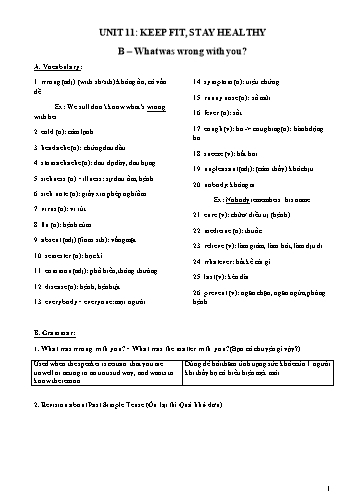Giáo án ôn tập English 7 - Unit 11+12
Bạn đang xem tài liệu "Giáo án ôn tập English 7 - Unit 11+12", để tải tài liệu gốc về máy hãy click vào nút Download ở trên.
Tóm tắt nội dung tài liệu: Giáo án ôn tập English 7 - Unit 11+12

UNIT 11: KEEP FIT, STAY HEALTHY B – What was wrong with you? A. Vocabulary: 1. wrong (adj) (with sb/sth): không ổn, có vấn 14. symptom (n): triệu chứng đề. 15. runny nose (n): sổ mũi Ex: We still don’t know what’s wrong with her. 16. fever (n): sốt 2. cold (n): cảm lạnh 17. cough (v): ho -> coughing (n): hành động ho 3. headache (n): chứng đau đầu 18. sneeze (v): hắt hơi 4. stomachache (n): đau dạ dày, đau bụng 19. unpleasant (adj): (cảm thấy) khó chịu 5. sickness (n) = illness: sự đau ốm, bệnh 20. nobody: không ai 6. sick note (n): giấy xin phép nghỉ ốm Ex: Nobody remembers his name. 7. virus (n): vi rút 21. cure (v): chữa/ điều trị (bệnh) 8. flu (n): bệnh cúm 22. medicine (n): thuốc 9. absent (adj) (from sth): vắng mặt 23. relieve (v): làm giảm, làm bớt, làm dịu đi 10. semester (n): học kì 24. whatever: bất kể cái gì 11. common (adj): phổ biến, thông thường 25. last (v): kéo dài 12. disease (n): bệnh, bệnh tật 26. prevent (v): ngăn chặn, ngăn ngừa, phòng 13. everybody = everyone: mọi người bệnh. B. Grammar: 1. What was wrong with you? = What was the matter with you? (Bạn có chuyện gì vậy?) Used when the speaker is certain that you are Dùng để hỏi thăm tình trạng sức khỏe của 1 người unwell or acting in an unusual way, and wants to khi thấy họ có biểu hiện mệt mỏi. know the reason. 2. Revision about Past Simple Tense (Ôn lại thì Quá khứ đơn) 1 9. There nobody there when I .. yesterday. (be), (arrive) 10. Na very tired when she . a bad cold two days ago. (be), (catch) III. Rewrite the second sentence so that it has a similar meaning to the first sentence : 1. What was Lien’s weight 2 months ago? How ? 2. What was wrong with you? What .................? 3. He’s 1 meter 60 centimeters tall. His ..... 4. What’s the matter with him? What ....? 5. Peter was 55 kilos. Peter . 3 B. Grammar: *Adverbs: Either, Neither/Nor - Express agreement in the negative. (as compared to express agreement in the affirmative, when we use “too” or “so”) - Either means “both”, “in addition”. - Neither means “similarly not”, “also not” - Either is used in negative statement. - Neither is used in affirmative statement. - Either stays at the end of the sentences, - Neither stays at the beginning of the sentences, normally after a comma (,) subject and auxiliary verb are inverted. S + auxiliary verb + not (+ O), either. Neither/Nor + auxiliary verb + Subject. Ex: Ex: * Either means “both”: He can’t speak Chinese. Neither/Nor can I. (not He can’t speak Chinese. I can’t, either. Neither/Nor I can) Affirmative statement – Negative statement Inversion * Either means “in addition”: I don’t go mountain climbing and I don’t go mountain walking, either. More examples: First sentences Sentences express agreement with either/ neither/nor She isn’t working today. I’m not, either. Neither/ Nor am I. We don’t like fat food. I don’t, either. Neither/Nor do I. She doesn’t, either. Neither/ Nor does she. He doesn’t like coffee. - His brother doesn’t, either. Neither/ Nor does his brother. - I don’t, either. Neither/ Nor do I. He didn’t have a holiday last year. We didn’t, either. Neither/ Nor did we. They weren’t at school last Tuesday. I wasn’t, either. Neither/ Nor was I. *Trạng từ: Either, Neither/Nor (cũng không) - Thể hiện sự tương đồng, đồng tình, đồng ý với ý phủ định. (khác với “too” or “so”) - Either nghĩa “tương đồng”, “thêm vào”. - Neither nghĩa “tương đồng” - Câu sử dụng either là câu phủ định. - Câu sử dụng neither là câu khẳng định. - Either nằm ở cuối câu, thường nằm sau dấu - Neither nằm ở đầu câu, theo sau là hình thức 5 6. Nam is hungry, and his friends .. 7. You should drink a lot of water, and tour brother. 8. I don’t know how to cook, and. my sister. 9. Han had a medical check- up yesterday, and we .. 10. The spinach isn’t fresh, and.. the cabbages. II. Complete the following passage: Yesterday, Hoa and her aunt went .. the market. They wanted to some meat, vegetables and fruit for their dinner. First, they went to the .. stall. There was a selection of meat on the stall: chicken, pork, and beef. Hoa doesn’t like pork and her aunt doesn’t . So they bought some beef. Next, they went to the . stall. They bought some spinach and cucumbers. Hoa likes them and does her aunt. They are her aunt’s favorite vegetables. Finally, Hoa and her aunt stopped a fruit stall. They wanted to buy a papaya and a pineapple, but they . ripe yet. Therefore, they bought oranges instead. 7
File đính kèm:
 giao_an_on_tap_english_7_unit_1112.docx
giao_an_on_tap_english_7_unit_1112.docx